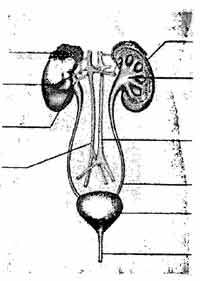I. INTRODUCTION
 The adrenals are two small glands, each weighing 3 to 5 grams. They are located above the kidneys. The adrenals have one of the highest rates of blood flow per gram of tissue and the highest content of Vitamin C per gram of any tissue in the body.
The adrenals are two small glands, each weighing 3 to 5 grams. They are located above the kidneys. The adrenals have one of the highest rates of blood flow per gram of tissue and the highest content of Vitamin C per gram of any tissue in the body.
Each adrenal gland is composed of two separate functional entities. The outer zone, .or cortex, accounts for 80 to 90% of the gland, and secretes adrenal steroids (Cortisol, DHEA(s) and Aldosterone). The inner zone or medulla comprises 10% to 20% of the gland, and secretes adrenaline and non-adrenaline, called catecholamines. Cortisol, DHEA and adrenaline are the three adrenal stress hormones.
II. THE ADRENAL RHYTHM AND ITS IMPORTANCE
The human adrenal gland does not secrete its steroid hormones at a constant level throughout the day. The hormones are actually released in a cycle with the highest value in the morning and lowest at night. This 24-hour cycle is called the circadian rhythm. An abnormal adrenal rhythm can influence many functions of the body, some of which are listed here.
- Energy Production
Abnormal adrenal function can alter the ability of cells to make energy for activities of daily living. People who have a hard time rising in the morning, and those people who suffer from energy slumps during the day (and may even be tired all the time), often have abnormal adrenal rhythms. - Muscle and Joint Function
Abnormal adrenal rhythms are known to compromise tissue healing. Reduced tissue repair and increased tissue breakdown can lead to muscle and joint injury and chronic pain. - Bone Health
The adrenal rhythm determines how well we build bone. If the night cortisol is elevated and the morning is too high, our bones do not rebuild well, and we are more prone to the osteoporotic process. - Immune System Health
Various immune cells (white blood cells) cycle in and out of the spleen and bone marrow for special conditioning, and possible nourishment and instructions. This immune system trafficking follows the cortisol cycle. So, if the cycle is disrupted, especially at night, then the immune system is adversely affected. - Short and long term stress is known to suppress the immune response on the surfaces of our body as in lungs, throat, urinary and intestinal tract. With the reduction in the surface antibody (called secretory IgA) the resistance to infection is reduced and allergic reactions are believed to increase.
- Sleep Quality
The ability to enter REM sleep cycles, i.e., regenerative sleep, is interrupted by high cortisol values at night and in the morning. Chronic lack of REM sleep can reduce the mental vitality and vigor of a person and induce depression. - Skin Regeneration
Human skin regenerates mostly during the night. With higher night cortisol values, less skin regeneration takes place. So, a normal cortisol rhythm is essential for optimal skin health. - Thyroid Function
The level of cortisol at the cell level controls thyroid hormone production. Quite often, hypothyroid symptoms such as fatigue and low body temperature are due to an adrenal maladaptation.
Edited from a brochure by Diagnos-Techs, Inc., a company that does adrenal diagnostic work.
.





